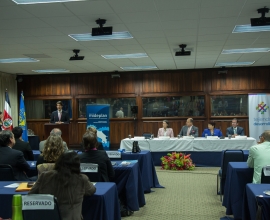Costa Rica, closer to having a National Policy for Regional Development
Costa Rica presents its National Law on Regional Development within the framework of a decentralised event during Europe's Open Days and with the support of EUROsociAL and DG REGIO
OPEN DAYS is an event held each year in Brussels at which civil servants of regional and local administrations, experts, and representatives of the academic world have the opportunity over four days to share good practices and specialised knowledge on regional and urban development. One of the most important elements of OPEN DAYS are the decentralised events. Under the title “A strategy for social inclusion in Costa Rica. Sharing experiences for growth”, on 4th and 5th November Costa Rica hosted one of these events, organised by MIDEPLAN with the support of EUROsociAL, the European cooperation programme with Latin America for promoting social cohesion, in collaboration with the EU Directorate-General for Regional Policy. The event was attended by over 150 people, including national and international guests.
The current administration wanted to share its draft National Law on Regional Development, which aims to reduce the gaps that separate less advantaged regions from more prosperous ones, improving growth and competitiveness to raise levels of well-being and improve living conditions for Costa Ricans. Participants in the event included Ronald Hall, principal advisor of the Director-General of Regional and Urban Policy of the European Commission, and Pelayo Castro Zuzuarregui, Head of the EU Delegation to Costa Rica. The President of Costa Rica, Luis Guillermo Solís, closed the event.
This initiative is promoted by MIDEPLAN, with the support of the Office of the First Lady (through the “Tejiendo Desarrollo” programme) in coordination with the Ministry of Finance and the Legislative Assembly. EUROsociAL has been supporting the entire process of drafting this law, which will give momentum to a national policy for territorial development. This law specifies governance and financing mechanisms, making implementation of this policy through concrete actions viable.
The mixed commission that will be responsible for boosting and monitoring regional development in Costa Rica has already been formed and approved in the Legislative Assembly. The draft law is expected to be sent to the parliament next month.
FIIAPP

